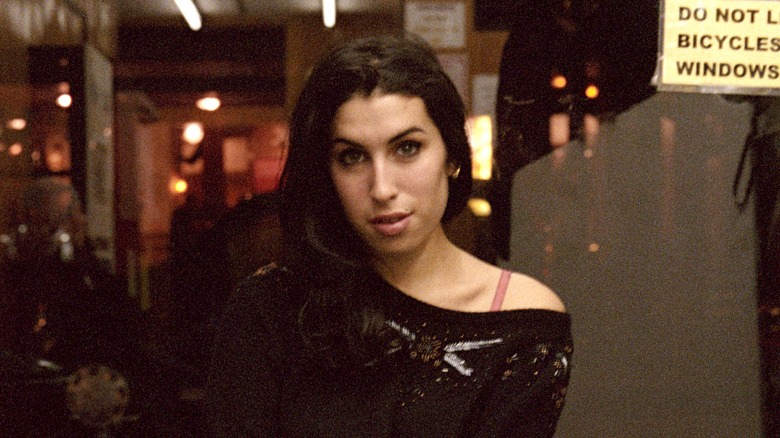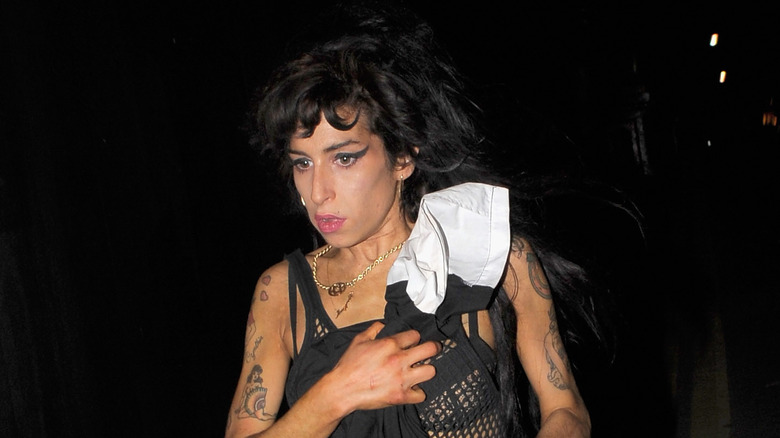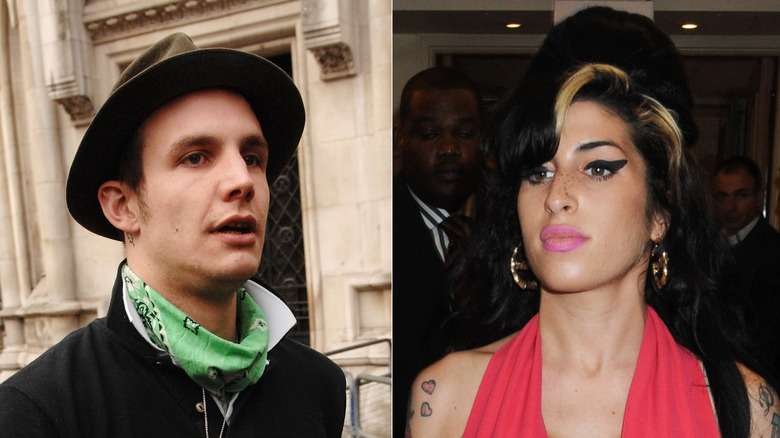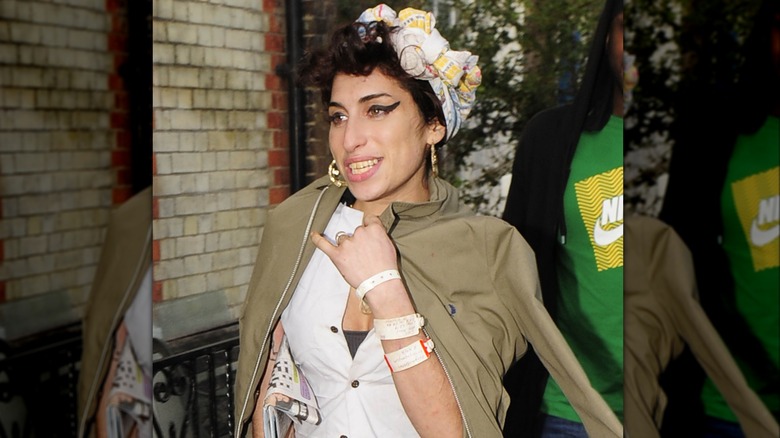Tragic Details About Amy Winehouse's Life
Trigger warning: This article contains mentions of eating disorders, addiction, domestic violence, and self-harm.
Hands down one of the greatest voices of her time, Amy Winehouse was a legend who left behind an incredible legacy when she died at just 27 years old. Not only can you pinpoint her bluesy alto voice from the first note of any of her hits, but her image may be the most distinguishable out there, from the beehive hairdo to Winehouse's iconic makeup routine. While she only released two albums during her career, "Frank" and "Back to Black," the impact she had on the music world has lasted for years.
As fondly as many of us remember her artistic endeavors and goosebump-inducing voice, Winehouse is also sadly remembered for the difficulties she faced. Even from a young age, the singer's short life was marred by tragedy and anguish, leading to a lifetime of struggle and a heartbreaking death. It could be argued that perhaps without these tragic details about Amy Winehouse's life, she may not have become the incredibly talented artist she was. In fact, she reportedly refused psychiatric treatment out of the sole fear that her creativity could be stifled if she sought help.
Sadly, we'll never know how things could have panned out for Winehouse had things gone differently in her life, but we can take a look back at the calamitous events that eventually led to the star's unfortunate demise.
Amy Winehouse's parents' divorce impacted her
Taxi driver Mitch Winehouse married pharmacist Janis Seaton in 1976 and had two children, Alex Winehouse in 1979 and the future music legend Amy Winehouse in 1983. They seemed like the perfect family, but the young girl's father, unfortunately, had a wandering eye, and the family knew about his cheating for years before he left them for a younger woman.
Mitch Winehouse struck up a relationship with his colleague Jane shortly after his daughter was born. "The children used to call Jane 'Daddy's work wife.' I did not leave home until Amy was ten, so the situation occurred for another eight or nine years before I left home. It was difficult," Mitch told the Daily Mail in 2008. After Mitch moved in with Jane, he divorced Janis and tied the knot with his mistress, and somehow, he didn't anticipate his actions to impact his children in any way.
Speaking on a BBC show (via the Daily Mail), Mitch explained: "I thought Amy was over it pretty quickly — in fact it felt at the time Amy felt no effect at all. Maybe she could not articulate it in words, but she certainly did it with music." It wasn't until he heard her song "What Is It About Men" that he realized how Winehouse had felt. "Understand once he was a family man / So surely I would never, ever go through it first hand / Emulate all the s*** my mother hated," she sang.
She developed an eating disorder in her teen years
Many made note of (with some mocking) Amy Winehouse's increasingly thin frame and swollen face over the years. It was often assumed that she appeared frail due to her struggles with addiction, but it may have been due to the fact that Winehouse also had bulimia nervosa, an eating disorder characterized by binge eating, followed by purging.
The singer's brother, Alex Winehouse, told Observer Magazine (via The Guardian) that the singer's eating disorder became an issue when she was just 17 years old. He claimed that binging and purging was something many of her friends did as well, saying: "They'd put loads of rich sauces on their food, scarf it down and throw it up. They stopped doing it, but Amy never really stopped. We all knew she was doing it but it's almost impossible [to tackle], especially if you're not talking about it." Alex went on to insist that his sister's eating disorder was in fact the true cause of her death, despite coroner Shirley Radcliffe ruling she had "died as a result of alcohol toxicity."
Winehouse's close friend and flat mate for a time, Naomi Parry, also spoke about trying to help the "Wake Up Alone" singer with her bulimia. "I think Amy started to lose control in other aspects of her life, which led her to control her eating instead. ... The irony is, when you have such an illness, you actually lose control," she theorized with Cosmopolitan.
Amy Winehouse famously dealt with addiction
What most would probably consider the major contributing factor to Amy Winehouse's tragic downward spiral was her well-documented dependency on drugs and alcohol. The singer spent years in the spotlight ridiculed for her behavior, much of which was prompted by drinking in excess, until alcohol poisoning eventually killed her.
In January 2008, a photo of Winehouse smoking crack cocaine was plastered over the front of tabloid magazines and what everyone had feared about her drug use appeared to be true. Her first manager, Nick Godwyn, spoke with The Times later that year about how he thought her then-husband Blake Fielder-Civil was to blame for her drug use. "Amy changed overnight after she met Blake. ... Her personality became more distant. And it seemed to me like that was down to the drugs. When I met her she smoked weed but she thought the people who took class-A drugs were stupid. She used to laugh at them," he said.
Between 2008 and 2009, Winehouse performed on stage drunkenly, stumbling and forgetting words to lyrics. Shows were canceled, the crowds booed at her, and it was clear that her alcohol dependency was now having an impact on her career. Winehouse's stepmother Jane spoke with The Independent in 2021, confirming that while the singer did curb her drug habit, alcohol soon replaced it. "We thought she was going to pull through. We thought she was going to beat it," she said.
She had a tumultuous relationship with Blake Fielder-Civil
There's so much we never knew about Amy Winehouse, but the person who probably knew her best was Blake Fielder-Civil. They had an on-again off-again relationship from 2005 after the pair met in a pub. He and Winehouse became inseparable for about six months and it was clear that they had co-dependency issues early on.
They broke up for a while with Fielder-Civil returning to his ex, but got back together after Winehouse released "Back to Black," inspired by her ex, and hit celebrity status overnight. They got engaged in April 2007 and tied the knot in May of the same year, but things were not as perfect as they seemed. In August 2007, the couple reportedly had a fight in a hotel, leaving Winehouse smeared with blood and Fielder-Civil covered in scratches.
It was around this time that the singer's drug use became apparent, as her husband was known to use crack and heroin and introduced it to Winehouse. "She said can I try some. ... Of course I regret it, not just because of the damage it's caused Amy and the loss of life, but the damage to her family but also to my family and also to me," Fielder-Civil later told The Guardian. He was arrested in late 2007 for a pub brawl and spent over two years behind bars while Winehouse continued to struggle. Before his release, Fielder-Civil filed for divorce, and the pair split in 2009.
Amy Winehouse coped by self-harming
While Amy Winehouse's self-destructive tendencies were public knowledge, a lesser-known way she coped with her stress was with self-harm. She had been spotted in early 2007 with red marks and scratches on her arms, sparking the rumor that she had caused the wounds intentionally. Winehouse dismissed the gossip, claiming they were the result of a drunken fall, but later told Q Magazine (via the Evening Standard) about her self-harm, saying: "It's a funny thing, a morbid curiosity. I'm talking about when I was nine. What does that feel like? 'Ow, that f***ing hurts.' It's probably the worst thing I've done."
That same year, Spin published a cover story about Winehouse detailing the photoshoot they held with her and Blake Fielder-Civil. The publication reported that a mirror had been broken into shards, which was used as part of the set, but that Winehouse had taken a piece of glass and carved "I love Blake" into her bare stomach. While the stunt certainly had shock value, we'll never know if this was her intention, or if she was dealing with some form of mental anguish at the time.
Some speculate that Amy Winehouse's father could have help her
As it turns out, one of Amy Winehouse's biggest hits, "Rehab," was a retelling of a true story. Speaking with the Daily Mail in 2007, the singer explained how she sang the first line for her producer on a whim. "I told him that I'd just made it up but that it was true and he encouraged me to turn it into a song, which took me five minutes," she said.
On August 8th, 2007 the singer was treated by paramedics after suffering an overdose, and it was discovered that she had heroin, cocaine, ketamine, alcohol, and ecstasy in her system. Her tour was canceled and her label released a vague statement about Winehouse suffering from exhaustion. Even the singer's father publicly denied the severity of her situation, saying she'd only had a little too much to drink.
The singer's friends implored Mitch Winehouse to get her help, but he refused because of her tour schedule, with some labeling him an enabler over his seeming unwillingness to aid his daughter. In an interview for the documentary "Reclaiming Amy" (via The Sun), Mitch defended his action — or lack thereof — saying: "No-one knew what to do. Because obviously the responsibility of the addiction lies with the person who's struggling with the addiction. ... How many times I took her into rehabs, and she'd walk out the next day. It's very difficult."
She faced harassment and abuse by the media
The lengths some paparazzi will go to get a good (or rather, unflattering) photo of a celebrity knows no bounds. We've seen the disturbing interactions the press have had with Meghan Markle and Prince Harry, as well as the poor treatment Britney Spears received from the media, and what happened to Princess Diana. Tragically, Amy Winehouse was yet another victim of the media circus, and she received harassment and abuse for years. Not only did she land on the cover of countless tabloid magazines, but she was tormented by photographers constantly, as they tried to catch her in compromising positions.
In 2009, Winehouse won an anti-harassment injunction that prohibited anyone from following her or taking pictures of her inside of her residence. A close source told The Guardian at the time: "Every time she got in her car she was chased or was jostled, and it has become unsafe not just for her, but the people around her. ... It has been mayhem a couple of times and Amy had to do something."
Tragically, the day Winehouse died, there was the biggest media frenzy around her Camden apartment yet. Her childhood friend and flatmate at the time, Tyler James, spoke with The Times about the tabloids' response when the singer was carried out in a body bag. "It was like a film premiere out there," he recalled.
Amy Winehouse's divorce devastated her
As Amy Winehouse and Blake Fielder-Civil's relationship began showing cracks in 2007, their drug use and domestic violence became public knowledge. The singer stood by her husband when he went to jail for assault on a pub landlord and perverting the course of justice. She even went as far as to sing "free Blakey, my fella" to the tune of "Free Nelson Mandela" at a birthday event for the South African activist.
However, after the couple had been apart for some time, it seemed Fielder-Civil's spell over Winehouse was slowly being lifted. While spending time in the Caribbean, she was photographed with actor Josh Bowman of "Revenge" fame, and told tabloid newspaper News of the World (via the Mirror): "I don't know what's going on with us [me and Blake] now, and for the time being I've just forgotten I'm even married."
Fielder-Civil filed for divorce while still in jail, citing adultery after clearly seeing the photos of his wife with another man. He had a different story, however, when he appeared on "The Jeremy Kyle Show" (via HuffPost), saying: "[Her father] said if you love her really you'll divorce her. I spoke to Amy about it and we sort of agreed that it would get everyone off our backs at least, you know, and we'd probably remarry." The divorce went through as Winehouse's issues with addiction seemed to worsen and she died just two years later.
She did eventually go to rehab
Amy Winehouse saw her fair share of rehabilitation centers, though she did make her feelings about them known in her hit "Rehab" in which she sings about not wanting to enter into treatment. In August of 2007, she and her then-husband Blake Fielder-Civil entered into rehab together, but it didn't last long. Winehouse returned to rehab solo in January 2008 after a photo of the singer smoking crack went viral.
A statement released by her record label Universal Music Group read: "Amy decided to enter the facility today after talks with her record label, management, family and doctors" (via The Guardian). "She has come to understand that she requires specialist treatment to continue her ongoing recovery from drug addiction." After it had been announced that Winehouse was in treatment, her father spoke with the BBC. "Part of the problem is she doesn't think she's got a problem. She thinks she can do what she does recreationally and get on with the rest of her life. ... Unless she wants to do it of her own accord, it's pointless," he said.
Winehouse's parents spoke of her "drug replacement program" in July of that year, telling the press that she was "doing really well" (via the BBC). The singer continued to enter into and exit treatment facilities over the course of several months and in June of 2011, Winehouse was officially released from a London clinic as an outpatient. Tragically, she would never return.
Amy Winehouse joined the 27 club in 2011
Kurt Cobain, Jimi Hendrix, Jean-Michel Basquiat, Anton Yelchin, and countless others were all 27 years old when they died. From actors to musicians, the members of the 27 Club each had a talent for creating art, and tragically, Amy Winehouse joined them on July 23, 2011. Although she had stopped using hard drugs, alcohol was still a problem for her and it was in the midst of a relapse that she died from alcohol toxicity. Winehouse was found in her London apartment unresponsive, and when the news broke that one of the greatest singers of all time had died, fans flocked to Camden to mourn the loss.
Like many celebrity deaths, more about the singer came to light after she died, including a chill-inducing, heartbreaking confession she made to her doctor in the hours before her death. Dr. Romete had been treating Winehouse as an outpatient, as she explained in an inquest following her death. The star attended the clinic the evening before she was found dead and admitted to having begun drinking again. The "Valerie" singer was tipsy when she was seen by Dr. Romete, who recounted that she'd warned her patient how serious her condition was and that it was dangerous for her to continue drinking. In response, Winehouse reportedly replied: "I don't want to die."
If you need help with an eating disorder, or know someone who does, help is available. Visit the National Eating Disorders Association website or contact NEDA's Live Helpline at 1-800-931-2237. You can also receive 24/7 Crisis Support via text (send NEDA to 741-741).
If you or anyone you know needs help with addiction issues, help is available. Visit the Substance Abuse and Mental Health Services Administration website or contact SAMHSA's National Helpline at 1-800-662-HELP (4357).
If you or someone you know is dealing with domestic abuse, you can call the National Domestic Violence Hotline at 1−800−799−7233. You can also find more information, resources, and support at their website.
If you or someone you know is struggling or in crisis, help is available. Call or text 988 or chat 988lifeline.org










